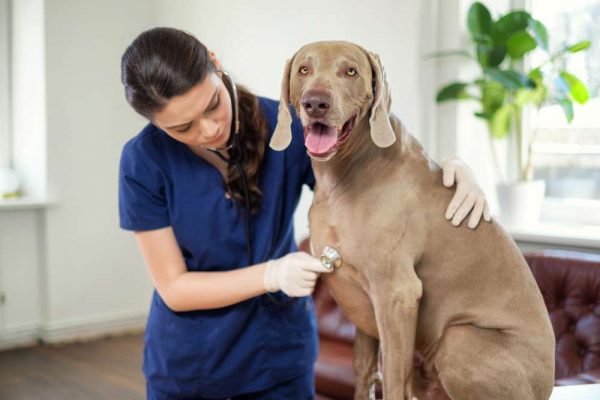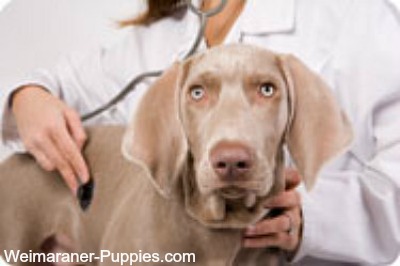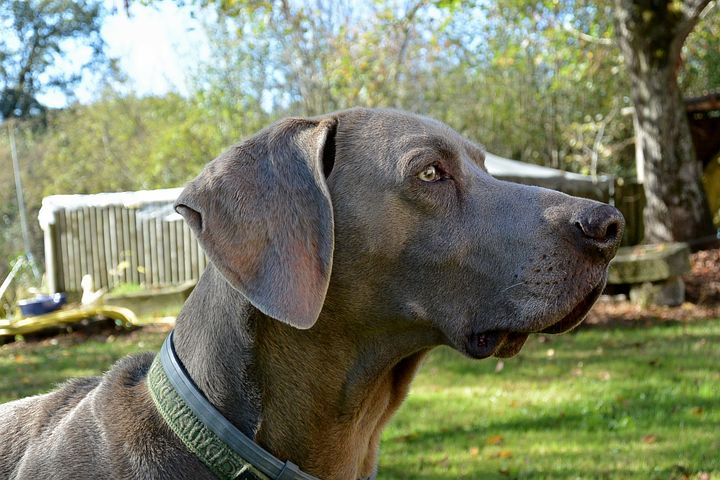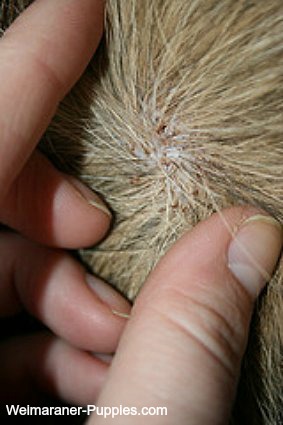Dog bloat, or GDV is a condition that develops quickly. If your dog has signs of dog bloat, it is an emergency, requiring IMMEDIATE medical attention.
The Weimaraner is one of the dog breeds that is susceptible to bloat. If you have a Weimaraner or another susceptible dog breed, you will need to understand what causes bloat, the symptoms, and what needs to be done if you suspect that your dog has bloat…
What is Dog Bloat?
Bloat is a condition where the stomach actually twists while it has gas in it, and it “bloats” or expands and is stretched.
Bloat in dogs is caused by the twisting of the dog’s stomach along its axis. The twisting occurs between the esophagus and upper intestine.
Often the stomach also has food and/or water in it, as well. When this condition occurs, the stomach is stretched and gas continues to build up.
When the exits are blocked (which occurs in bloat), there is no way for the dog to expel the gas. The build-up of gas causes an enormous amount of abdominal pain.
A slow-eat dog bowl can save your dog’s life!

High Risk Breeds for Bloat
Dog bloat typically occurs in large, deep-chested dogs.
The Weimaraner is 3rd on the list of breeds with the highest risk of getting bloat. According to the AKC (American Kennel Club), other breeds that should be watchful of this condition are (listed alphabetically):
- Great Dane (#1 breed at risk)
- Saint Bernard (#2 breed at risk)
- Weimaraner (#3 breed at risk)
- Akita
- Bloodhound
- Collie
- Doberman Pinscher
- German Shepherd
- Gordon Setters
- Irish Setter
- Irish Wolfhound
- Newfoundland
- Rottweiler
- Standard Poodle
What Causes Dog Bloat?
Stress or anxiety can trigger an acute attack of bloat in dogs. Weimaraners, who are prone to separation anxiety, are a good example of this.
As your dog ages, his chances for getting dog bloat increase. Bloat in dogs is most common in dogs that are 7-10 years old. It is not common in puppies, even in those dog breeds that are prone to getting bloat.

Male dogs seem to get bloat more often than females. And fast eaters are more at risk than dogs who eat more slowly.
While there are differing opinions about raised bowls for dogs, there is some evidence that raised bowls can cause bloat.
Eating too fast can cause dog bloat. A slow-eat dog bowl will force your dog to eat slower.
Drinking too much water before or after eating and rigorous exercise before or after meals also can cause bloat.
Last, if your dog’s family (parent or sibling) had a history of bloat, your dog is more likely to develop bloat as she ages. The risk is increased by 63%.
Prevention of Bloat in Dogs
If you know that you have a dog with a family history of bloat, or you have a dog breed that is susceptible to it, then you would be wise to take steps to prevent an attack.
Here are some things that you can do to prevent bloat in dogs:
- To prevent your dog from eating too fast, purchase one of these special food bowls , designed to help your dog eat more slowly.
- Avoid the use of raised bowls. Even if your dog is aging, the benefits of a raised bowl do not outweigh the risks.
- Feed your dog smaller meals, three times a day, instead of one large meal once a day.
- Limit water intake before and after meals. Also limit water intake after your dog has been exercising.
- Keep your dog calm, before and after meals. If you are hunting or have your dog running, your dog needs to rest and relax, for at least 20 minutes, before eating a meal.
- Dogs who get bloat have often eaten a large meal, followed by exercise. Give your dog a time out or rest period, for at least 20 minutes after eating.
Most commonly, dogs with bloat have eaten a large meal, followed by exercise and repeated attempts to vomit.
Simply knowing your dog and paying attention to any unusual behavior around eating time, can help you identify a problem before it gets out of hand.
To do this, you’ll need to become familiar with the symptoms.






Leave a Reply